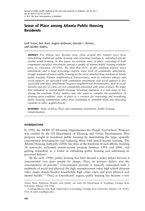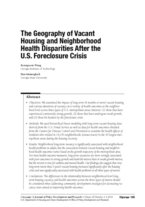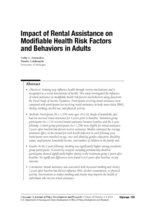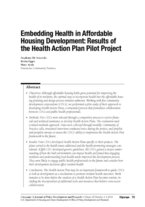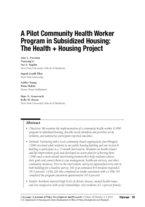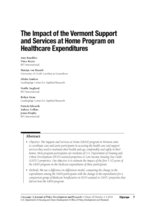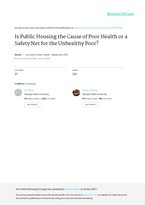Found 181 resources.
0
0
0
During this All In webinar, Caroline Fichtenberg of SIREN reviewed the current landscape of assessment tools and outcomes measures for social needs. Karis Grounds of 2-1-1 San Diego explained how they incorporated social needs assessment into their Risk Rating Scale, which helps them better serve clients while showing the impact of their services.
Topics: Data sharing, Health, Low-income, Metrics, Partnerships, West Coast
0
0
0

A growing recognition of the importance of social determinants of health (SDOH) has led to a proliferation of screening and assessment tools, but there are currently no national standards for how to systematically capture and address the non-health needs of patients. To provide some guidance for communities just starting out on this path, All In: Data for Community Health hosted a webinar featuring two subject matter experts.
Topics: Data sharing, Health, Metrics, Partnerships
0
0
0
CLPHA’s Education Working Group hosts a webinar with Bright by Text, a texting platform that connects caregivers with tools for improving educational outcomes for children. Bright by Text’s President and Senior Program Manager share information about their partnerships with housing authorities and non-profit housing providers across the country, providing insight into the benefits of connecting with residents through technology. CLPHA members who work with Bright by Text outline their respective initiatives and discussed local program goals.
Topics: Child welfare, CLPHA, Dual-generation, Early childhood, Family engagement, Health, Home visiting, Housing, Housing Is Working Group, Partnerships, Place-based, Preventative care, Safety, School-readiness
0
0
0
The third in a series of Research-to-Impact briefs by Chapin Hall at the University of Chicago on understanding and addressing youth homelessness.
Topics: Early childhood, Family engagement, Home visiting, Low-income, Partnerships, Pre-natal, Research, Youth
0
0
0
Although the rental assistance programs varied, key themes emerged, including (1) most programs, recognizing the impact of housing stability on health outcomes, targeted populations served by state or local health and human services programs; (2) most programs served a growing number of households over time; (3) funding generally increased over time and most of it came from general revenue; and (4) programs involved collaboration between the housing and health and human services agencies to ensure clients’ needs were comprehensively met.
Topics: Funding, Health, Housing, Legislation & Policy, Low-income, Partnerships, Place-based, Research, Stability
0
0
0
The Colorado Coalition for the Homeless (CCH) has been investing in supportive housing since 1990. Since that time, this comprehensive community health center has developed nearly 1,700 units of housing, and is one of the country’s leaders in integrating health care and housing for a vulnerable population.
This webinar discusses how CCH finances its capital development; how they plan, design, and manage multiple projects simultaneously; how they integrate housing and health care services; and how they include property management staff in a coordinated approach to care. This conversation...
Topics: Health, Homelessness, Low-income, Medicaid / Medicare, Mental health, Pacific Northwest, Place-based, Supportive housing
0
0
0
Using administrative data from Massachusetts, this study analyzes the health care use and Medicaid expenditures of families who experienced one or more homeless episodes between 2008 and 2015 to investigate how health care use is related to emergency housing experiences.
Topics: Asthma, Child welfare, Depression, Health, Homelessness, Housing, Low-income, Medicaid / Medicare, Metrics, Pre-natal, Research
0
0
0
Housing providers and counselors in urban, suburban, and rural areas can help refugees and resettlement agencies navigate challenging rental markets, understand the evidence about how housing and neighborhoods matter, and prepare for long-term success as a renter or owner.
Topics: Community development, Housing, Immigrants, Research, Stability
0
1
1
About 20 percent of adults in sheltered homeless families have a disability, compared with 9 percent of all US adults, yet few studies have addressed the intersection of disability and housing instability. A recent study explored the relationship between disabilities and Supplemental Security Income (SSI)/Social Security Disability Insurance (SSDI) income that homeless families reported when they entered emergency shelters, as well as later outcomes, such as housing stability, self-sufficiency, and food insecurity. It also examined how housing interventions affect SSI/SSDI income receipt.
Topics: Disabilities, Homelessness, Housing, Low-income, Research, Stability
0
0
0
Many social issues stem from a history of unstable, unaffordable, and poor-quality housing. Research shows that housing is the first rung on the ladder to economic opportunity for individuals and that a person’s access to opportunity is intrinsically linked with that of the community at large. As the gap between rents and incomes widens, it is critical that professionals in fields outside housing—including health, education, and economic development, among others—understand its central importance.
Topics: Community development, Education, Health, Housing, Low-income, Metrics, Partnerships, Research
0
0
0
This report compares the profile of the schools accessible to HUD-assisted and LIHTC households in 2016 to the profile of those accessible to other similar households within the same state or metropolitan area. In brief, we find that families receiving all four major types of federal housing assistance lived near lower performing and higher poverty schools than other poor families with children as well as other renters with children.
Topics: Education, Housing, Low-income, Mobility, Racial inequalities, Research, Youth
0
0
0
The study finds three out of five adults across the U.S. had at least one adverse experience in their childhood, such as divorce, a parent's death, physical or emotional abuse, or a family member's incarceration or substance abuse problem. A quarter of adults have at least three such experiences in childhood, which – according to other research — increases their risk for most common chronic diseases, from heart disease and cancer to depression and substance abuse.
Topics: Child welfare, Depression, Early childhood, Low-income, Mental health, Racial inequalities, Research
0
0
0
Annuities, long-term care insurance (LTCI), and reverse mortgages appear to offer important consumption smoothing benefits to the elderly, yet private markets for these products are small. A prominent idea is to combine LTCI and annuities to alleviate both supply (selection) and demand (liquidity) problems in these markets. This paper shows that if consumers typically liquidate home equity only in the event of illness, then LTCI and annuities become substitutes and less attractive. Simulations confirm that without home equity loans, both LTCI and constant real annuities may be welfare...
Topics: Asset building, Health, Housing, Medicaid / Medicare, Seniors
 Shared by Housing Is
on Aug 9, 2018
Shared by Housing Is
on Aug 9, 2018 0
0
0
For almost two decades now, cities around the country have been demolishing traditional public housing and relocating residents to subsidized private market rental housing. In this paper, we examine sense of place, consisting of both community and place attachment, among a sample of Atlanta public housing residents prior to relocation.
Topics: Asset building, Housing, Legislation & Policy, Low-income, Mental health, Mobility, Research, South, Stability
 Shared by Housing Is
on Aug 9, 2018
Shared by Housing Is
on Aug 9, 2018 0
1
0
We examined the impact of long-term (6 months or more) vacant housing and various durations of vacancy on a variety of health outcomes at the neighborhood level across three types of U.S. metropolitan areas (metros): (1) those that have experienced consistently strong growth, (2) those that have undergone weak growth, and (3) those hit hardest by the foreclosure crisis
Topics: Asset building, Asthma, Community development, Health, Housing, Low-income, Mental health, Metrics, Research, Safety, Transportation
 Shared by Housing Is
on Aug 1, 2018
Shared by Housing Is
on Aug 1, 2018 0
0
0
Housing may influence health through various mechanisms and is
recognized as a social determinant of health. This study investigated the influence of rental assistance on modifiable health risk factors and behaviors using data from the Panel Study of Income Dynamics. Participants receiving rental assistance were compared with participants not receiving rental assistance on body mass index (BMI), obesity, smoking, alcohol use, and physical activity
Topics: Exercise, Health, Housing, Low-income, Metrics, Nutrition, Obesity, Partnerships, Racial inequalities, Research, Smoke-free, Substance abuse
 Shared by Housing Is
on Aug 1, 2018
Shared by Housing Is
on Aug 1, 2018 0
0
0
Homelessness among children is correlated with developmental delays, fair or poor health, and high healthcare utilization. Associations of homelessness specifically among infants younger than 12 months, however, are unknown. This study evaluates homelessness during infancy as a risk for adverse infant and maternal health and hardship.
Topics: Child welfare, Depression, Disabilities, Dual-generation, Early childhood, Education, Family engagement, Food insecurity, Grade-level proficiency, Health, Homelessness, Housing, Low-income, Metrics, Partnerships, Pre-natal, Research, School-readiness, Youth
 Shared by Housing Is
on Aug 1, 2018
Shared by Housing Is
on Aug 1, 2018 0
0
0
This study draws on qualitative interview data to examine transitions into rent-assisted housing as they relate to diabetes self-management behaviors.
Topics: East Coast, Health, Homelessness, Housing, Low-income, Mental health, Metrics, Nutrition, Research, Stability
 Shared by Housing Is
on Aug 1, 2018
Shared by Housing Is
on Aug 1, 2018 0
0
0
Although affordable housing holds great potential for improving the
health of its residents, the optimal way to incorporate health into the affordable housing planning and design process remains unknown. Working with five community development corporations (CDCs), we performed a pilot study of their approach to developing Health Action Plans, a structured process that formalizes collaboration
between CDCs and public health professionals.
Topics: Depression, Green, Health, Housing, Low-income, Partnerships, Research
 Shared by Housing Is
on Aug 1, 2018
Shared by Housing Is
on Aug 1, 2018 0
0
0
We sought to learn more about how state- and locally funded rental
assistance programs were created, how they are structured, whom they serve, and how they are funded.
Topics: Cost effectiveness, Data sharing, Disabilities, Family engagement, Funding, Health, Homelessness, Housing, Legislation & Policy, Low-income, Partnerships, Research, Supportive housing
 Shared by Housing Is
on Aug 1, 2018
Shared by Housing Is
on Aug 1, 2018 0
0
0
Work requirements in public housing are highly controversial, and
little is known about their impacts. We examined how implementation of a work requirement paired with supportive services by Charlotte Housing Authority has impacted residents’ overall well-being. Although the policy might improve well-being
by increasing household income, it might also engender stress through greater housing precarity.
Topics: Depression, Disabilities, Education, Food insecurity, Health, Housing, Low-income, Medicaid / Medicare, Mental health, Metrics, MTW, Partnerships, Racial inequalities, Research, South, Workforce development
 Shared by Housing Is
on Aug 1, 2018
Shared by Housing Is
on Aug 1, 2018 0
0
0
We examine the implementation of a community health worker (CHW)
program in subsidized housing, describe needs identified and priorities set by residents, and summarize participant-reported outcomes.
Topics: East Coast, Health, Housing, Low-income, Mental health, Metrics, Partnerships, Place-based, Racial inequalities, Research
 Shared by Housing Is
on Aug 1, 2018
Shared by Housing Is
on Aug 1, 2018 0
0
0
The Support and Services at Home (SASH) program in Vermont aims
to coordinate care and assist participants in accessing the health care and support services they need to maintain their health and age comfortably and safely in their homes. Most program participants are residents of U.S. Department of Housing and Urban Development (HUD)-assisted properties or Low-Income Housing Tax Credit
(LIHTC) properties. Our objective is to estimate the impact of the first 5 1/2 years of the SASH program on the Medicare expenditures of these participants.
Topics: Cost effectiveness, Dual-eligibles, East Coast, Health, Home visiting, Housing, Legislation & Policy, Low-income, Medicaid / Medicare, Metrics, Seniors
 Shared by Housing Is
on Aug 1, 2018
Shared by Housing Is
on Aug 1, 2018 0
0
0
This review discusses how attitudes toward affordable housing are likely shaped by factors that influence other social policy attitudes— particularly ideology and stereotyping. The author concludes with recommendations and methods that planners can use to manage public opposition and influence attitudes toward affordable housing.
Topics: Housing, Legislation & Policy, Low-income, Racial inequalities, Research
 Shared by Housing Is
on Jul 27, 2018
Shared by Housing Is
on Jul 27, 2018 0
0
0
The purpose of this paper is to investigate the association between public housing and health conditions: specifically, we ask if residents entered public housing already ill or if public housing may cause the poor health of its residents.
Topics: Health, Housing, Low-income, Mental health, Metrics, Mobility, Nutrition, Racial inequalities, Research, South
 Shared by Housing Is
on Jul 27, 2018
Shared by Housing Is
on Jul 27, 2018 

